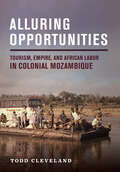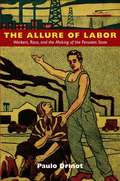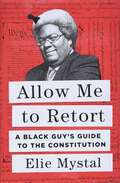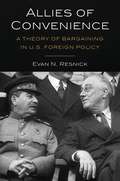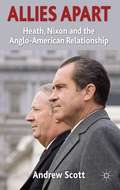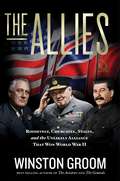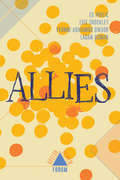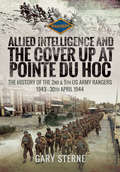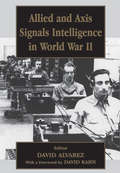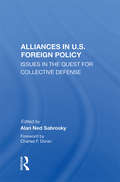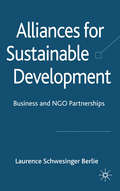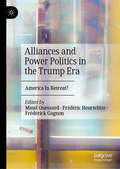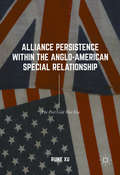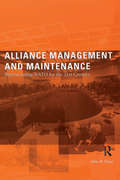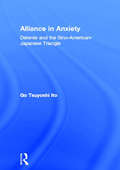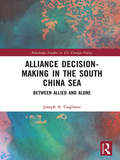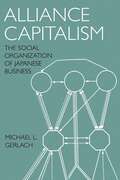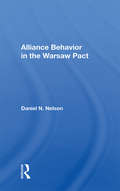- Table View
- List View
Alluring Opportunities: Tourism, Empire, and African Labor in Colonial Mozambique (Histories and Cultures of Tourism)
by Todd ClevelandAlluring Opportunities examines the lives of African laborers in the tourism industry in the Portuguese colony of Mozambique and the social ascension that many of these workers achieved in spite of demanding conditions. From the origin of the colonial period until its end in 1975, the tourism industry developed on the backs of these laborers and ultimately became an important source of foreign exchange for Portugal.Todd Cleveland explores the daily experiences of local tourism workers in the genesis and expansion of this vital industry with an analytical utility that transcends Africa's borders by complicating the narrative established and reinforced by an expansive body of literature that stresses the exploitation of indigenous tourism workers. He argues that just as foreign tourists embraced the opportunity to travel to various locations in Mozambique, so too did many Indigenous laborers seize opportunities for employment in the tourism industry in an effort to realize social mobility via both the steady wages that they earned and their daily interactions with sojourning clientele. Alluring Opportunities reconstructs these workers' lives, highlighting their critical contributions to the local industry, while also prompting a reconsideration of Indigenous labor and social mobility in colonial Africa. As a result, Cleveland reveals new ways of thinking, more broadly, about the ways that tourism shapes processes of empire, interracial interactions, and power relations.
The Allure of Labor: Workers, Race, and the Making of the Peruvian State
by Paulo DrinotIn The Allure of Labor, Paulo Drinot rethinks the social politics of early-twentieth-century Peru. Arguing that industrialization was as much a cultural project as an economic one, he describes how intellectuals and policymakers came to believe that industrialization and a modern workforce would transform Peru into a civilized nation. Preoccupied with industrial progress but wary of the disruptive power of organized labor, these elites led the Peruvian state into new areas of regulation and social intervention designed to protect and improve the modern, efficient worker, whom they understood to be white or mestizo. Their thinking was shaped by racialized assumptions about work and workers inherited from the colonial era and inflected through scientific racism and positivism. Although the vast majority of laboring peoples in Peru were indigenous, in the minds of social reformers indigeneity was not commensurable with labor: Indians could not be workers and were therefore excluded from the labor policies enacted in the 1920s and 1930s and, more generally, from elite conceptions of industrial progress. Drinot shows how the incommensurability of indigeneity with labor was expressed in the 1920 constitution, in specific labor policies, and in the activities of state agencies created to oversee collective bargaining and provide workers with affordable housing, inexpensive food, and social insurance. He argues that the racialized assumptions of the modernizing Peruvian state are reflected in the enduring inequalities of present-day Peru.
Allow Me To Retort: A Black Guy's Guide to the Constitution
by Elie MystalAllow Me to Retort is an easily digestible argument about what rights we have, what rights Republicans are trying to take away, and how to stop them. <p><p>Mystal explains how to protect the rights of women and people of color instead of cowering to the absolutism of gun owners and bigots. He explains the legal way to stop everything from police brutality to political gerrymandering, just by changing a few judges and justices. He strips out all of the fancy jargon conservatives like to hide behind and lays bare the truth of their project to keep America forever tethered to its slaveholding past. <p><p> Mystal brings his trademark humor, expertise, and rhetorical flair to explain concepts like substantive due process and the right for the LGBTQ community to buy a cake, and to arm listeners with the knowledge to defend themselves against conservatives who want everybody to live under the yoke of 18th-century White men. The same tactics Mystal uses to defend the idea of a fair and equal society on MSNBC and CNN are in this book, for anybody who wants to deploy them on social media. <p><p> You don’t need to be a legal scholar to understand your own rights. You don’t need to accept the “Whites only” theory of equality pushed by conservative judges. You can listen to this book to understand that the Constitution is trash but doesn’t have to be.
The Allocation of Regulatory Competence in the EU Emissions Trading Scheme
by Josephine Van ZebenThe European Union's Emissions Trading System (EU ETS) is the world's largest carbon trading market. This book offers a new perspective on the EU ETS as a multi-level governance regime, in which the regulatory process is composed of three distinct 'competences' - norm setting, implementation, and enforcement. Are these competences best combined in a single regulator at one level of government or would they be better allocated among a variety of regulators at different levels of government? The combined legal, economic, and political analysis in this book reveals that the actual allocation of competences within the EU ETS diverges from a hypothetical ideal allocation in important ways, and provides a political economy explanation for the existing allocation of norm setting, implementation and enforcement competences among various levels of European government.
Allocating Federal Funds for Science and Technology
by Committee on Criteria for Federal Support of Research DevelopmentThe United States faces a new challenge--maintaining the vitality of its system for supporting science and technology despite fiscal stringency during the next several years. To address this change, the Senate Appropriations Committee requested a report from the National Academies of Sciences and Engineering and the Institute of Medicine to address "the criteria that should be used in judging the appropriate allocation of funds to research and development activities; to examine the appropriate balance among different types of institutions that conduct such research; and to look at the means of assuring continued objectivity in the allocation process." In this eagerly-awaited book, a committee of experts selected by the National Academies and the Institute responds with 13 recommendations that propose a new budgeting process and formulates a series of questions to address during that process. The committee also makes corollary recommendations about merit review, government oversight, linking research and development to government missions, the synergy between research and education, and other topics. The recommendations are aimed at rooting out obsolete and inadequate activities to free resources from good programs for even better ones, in the belief that "science and technology will be at least as important in the future as they have been in the past in dealing with problems that confront the nation." The authoring committee of this book was chaired by Frank Press, former President of the National Academy of Sciences (1981-1993) and Presidential Science and Technology Advisor (1977-1981).
Allies or Adversaries
by Jennifer N. BrassGovernments throughout the developing world have witnessed a proliferation of non-governmental, non-profit organizations (NGOs) providing services like education, healthcare and piped drinking water in their territory. In Allies or Adversaries, Jennifer N. Brass explains how these NGOs have changed the nature of service provision, governance, and state development in the early twenty-first century. Analyzing original surveys alongside interviews with public officials, NGOs and citizens, Brass traces street-level government-NGO and state-society relations in rural, town and city settings of Kenya. She examines several case studies of NGOs within Africa in order to demonstrate how the boundary between purely state and non-state actors blurs, resulting in a very slow turn toward more accountable and democratic public service administration. Ideal for scholars, international development practitioners, and students interested in global or international affairs, this detailed analysis provides rich data about NGO-government and citizen-state interactions in an accessible and original manner.
Allies of Convenience: A Theory of Bargaining in U.S. Foreign Policy
by Evan N. ResnickSince its founding, the United States has allied with unsavory dictatorships to thwart even more urgent security threats. How well has the United States managed such alliances, and what have been their consequences for its national security? In this book, Evan N. Resnick examines the negotiating tables between the United States and its allies of convenience since World War II and sets forth a novel theory of alliance bargaining.Resnick’s neoclassical realist theory explains why U.S. leaders negotiate less effectively with unfriendly autocratic states than with friendly liberal ones. Since policy makers struggle to mobilize domestic support for controversial alliances, they seek to cast those allies in the most benign possible light. Yet this strategy has the perverse result of weakening leverage in intra-alliance disputes. Resnick tests his theory on America’s Cold War era alliances with China, Pakistan, and Iraq. In all three cases, otherwise hardline presidents bargained anemically on such pivotal issues as China’s sales of ballistic missiles, Pakistan’s development of nuclear weapons, and Iraq’s sponsorship of international terrorism. In contrast, U.S. leaders are more inclined to bargain aggressively with democratic allies who do not provoke domestic opposition, as occurred with the United Kingdom during the Korean War. An innovative work on a crucial and timely international relations topic, Allies of Convenience explains why the United States has mismanaged these “deals with the devil”—with deadly consequences.
Allies Apart
by Andrew ScottTo date, the Heath-Nixon years have been widely portrayed as marking a low-point in the history of Anglo-American relations even the end of the 'special relationship'; using a wealth of archival material on both sides of the Atlantic, and examining a range of global developments, Allies Apart offers a fresh interpretation of this pivotal period. "
The Allies: Roosevelt, Churchill, Stalin, and the Unlikely Alliance That Won World War II
by Winston GroomBest-selling author Winston Groom tells the complex story of how Franklin Roosevelt, Winston Churchill, and Joseph Stalin--the three iconic and vastly different Allied leaders--aligned to win World War II and created a new world order.By the end of World War II, 59 nations were arrayed against the axis powers, but three great Allied leaders--Franklin Roosevelt, Winston Churchill, and Joseph Stalin--had emerged to control the war in Europe and the Pacific. Vastly different in upbringing and political beliefs, they were not always in agreement--or even on good terms. But, often led by Churchill's enduring spirit, in the end these three men changed the course of history. Using the remarkable letters between the three world leaders, enriching narrative details of their personal lives, and riveting tales of battles won and lost, best-selling historian Winston Groom returns to share one of the biggest stories of the 20th century: The interwoven and remarkable tale, and a fascinating study of leadership styles, of three world leaders who fought the largest war in history.
Allies (Boston Review Forum)
by Ed Pavlic Evie Shockley Ladan Osman Yvonne Adhiambo OwuorOriginal poetry, fiction, and cultural criticism explore issues of trust, bridge-building, difference, and betrayal, both political and private.How do we know who is on our side? Is it possible for someone who is not like us to share our hopes? Can links forged by empathy or mutual interest match those created by shared experience? What can we gain from alliances that we cannot achieve on our own?These are difficult question to answer even in intimate settings, and more so in arenas of cultural and political struggle. Through original poetry, fiction, and cultural criticism from both established writers and newcomers, Allies offers unique insights into issues of trust, bridge-building, difference, and betrayal. Drawing on the prophetic power of the imagination to conjure both the possible dangers and life-giving possibilities of alliances—be they political, private (such as marriage), therapeutic, or even aesthetic (between readers and writers, for example)—Allies will be essential reading for our times.Allies is the first publication of Boston Review's newly inaugurated Arts in Society department. A radical revisioning of the magazine's poetry and fiction, the department unites them—along with cultural criticism and belles lettres—into a project that explores how the arts can speak directly to the most pressing political and civic concerns of our age, from growing inequality to racial and gender regimes, a disempowered electorate, and a collapsing natural world.
Allied Intelligence and the Cover Up at Pointe Du Hoc: The History of the 2nd & 5th US Army Rangers, 1943–30th April 1944
by Gary SterneThe first volume in a groundbreaking work of WWII history presents a startlingly different narrative of D-Day based on newly released documents. Though the historic importance of the Allied attack on the gun battery at Pointe du Hoc is well known, historian Gary Sterne has uncovered striking new information about the events in recently released documents. In a landmark work of World War II history, Sterne presents a trenchant reassessment of the battle for Pointe du Hoc in a vivid, two-volume account that reveals the true mission of the 2nd and 5th U.S. Army Rangers. This first volume looks at the critical months leading up to the Normandy invasion, following the preparations of the Rangers from their arrival in England in 1943. Sterne examines the orders they received, along with dozens of aerial reconnaissance photographs of Omaha Beach, Pointe et Raz de la Percée, Pointe du Hoc and Maisy—as well as French Resistance reports. Shown in chronological order and in their original format, many of these documents are still marked TOP SECRET. Together with the second volume, The Cover Up at Omaha Beach, this revelatory work will change the way historians view the Pointe du Hoc battle from now on.
Allied and Axis Signals Intelligence in World War II (Studies in Intelligence)
by David AlvarezThe importance of codebreaking and signals intelligence in the diplomacy and military operations of World War II is reflected in this study of the cryptanalysts, not only of the US and Britain, but all the Allies. The codebreaking war was a global conflict in which many countries were active. The contributions reveal that, for the Axis as well as the Allies, success in the signals war often depended upon close collaboration among alliance partners.
Alliances In U.s. Foreign Policy: Issues In The Quest For Collective Defense
by Alan Ned SabroskyThis volume addresses a selected set of issues that appear to be especially salient with regard to alliances in U.S. foreign policy in general and to North Atlantic Treaty Organization in particular, presenting questions about alliance purpose and cohesion that demand a response.
Alliances for Sustainable Development: Business and NGO Partnerships
by Laurence Schwesinger BerlieA lively and hands-on exploration of corporate-NGO alliances. It offers original insight to understand why alliances exist and to what end. It also looks into the asymmetries between partners and dwells on three crucial aspects of alliances management : alliance capacity development, stakeholder involvement and alliance metrics.
Alliances and Power Politics in the Trump Era: America In Retreat?
by Maud Quessard Frédéric Heurtebize Frédérick GagnonThis volume examines the evolution of US foreign policy since Donald Trump’s accession to the presidency and the strategic challenges confronting the United States in a changing geopolitical environment. Trump has delivered on his promises to break with past policies and this has, for the most part, revealed a policy of retrenchment that has jeopardized US alliances. The book focuses on the current state and future of transatlantic relations, on Washington’s policy in the Middle East and Africa, on the administration’s use of the economic weapon in international relations, but also on the American response to the return of great power competition in the face of an assertive China and resurgent Russia. The contributions gather the inputs of a transatlantic community of scholars combining academics, think-tank fellows, former policy-makers and administration officials from both sides of the Atlantic.
Alliance Persistence within the Anglo-American Special Relationship
by Ruike XuThis book seeks to demystify the persistence of the Anglo-American Special Relationship (AASR) in the post-Cold War era by constructing a new theory of alliance persistence. This theory of alliance persistence not only has stronger explanatory power than the predominant model of interests and sentiments, but also opens a new way for understanding what factors have prevented the AASR from collapsing. This innovative new volume fills the gap in AASR literature by focusing on the important role of institutionalization in sustaining the AASR, a factor that has been significantly overlooked in existing academic research.
Alliance Management and Maintenance: Restructuring NATO for the 21st Century
by John R. DeniThe maintenance and management of the NATO alliance is a delicate balancing act between responding to security threats and navigating the bargaining positions of the member states. This book highlights how the alliance managed to maintain that balance in an area critical to its operations today around the world - changing its Cold War-era doctrine and structures. Based on his findings, John Deni debates whether the NATO alliance ought to be considered by policy makers to be a political organization first and a military one second. Providing new empirical data valuable to our understanding of NATO's post-Cold War evolution, the book offers a unique perspective on alliance management and maintenance. It sheds light on the continuing debate surrounding NATO's role in security, how the alliance will fight and whether NATO is properly structured to continue providing security for its member states.
Alliance in Anxiety: Detente and the Sino-American-Japanese Triangle
by Go Tsuyoshi ItoFirst Published in 2003. Routledge is an imprint of Taylor & Francis, an informa company.
Alliance Formation in Civil Wars
by Fotini ChristiaSome of the most brutal and long-lasting civil wars of our time involve the rapid formation and disintegration of alliances among warring groups, as well as fractionalization within them. It would be natural to suppose that warring groups form alliances based on shared identity considerations – such as Christian groups allying with Christian groups – but this is not what we see. Two groups that identify themselves as bitter foes one day, on the basis of some identity narrative, might be allies the next day and vice versa. Nor is any group, however homogeneous, safe from internal fractionalization. Rather, looking closely at the civil wars in Afghanistan and Bosnia and testing against the broader universe of fifty-three cases of multiparty civil wars, Fotini Christia finds that the relative power distribution between and within various warring groups is the primary driving force behind alliance formation, alliance changes, group splits and internal group takeovers.
Alliance Decision-Making in the South China Sea: Between Allied and Alone (Routledge Studies in US Foreign Policy)
by Joseph A. GaglianoThe combination of rising Chinese power and longstanding territorial disputes has drawn increased attention and threats to the Asia-Pacific region. Five smaller powers contest Beijing’s claims; Malaysia, the Philippines, Vietnam, Brunei and Indonesia, with the United States viewed as the most likely counterbalance to coercive behavior towards them. However, only one of these five states - the Philippines -has maintained a guarantee of protection through alliance with the US. What factors have influenced state decisions to form security relationships with Washington, and what does the evolution of these factors portend for future security relationships in the South China Sea? Using research on U.S. policy preferences based on recently declassified material, this book produces conclusions previously inaccessible beyond classified forums. The author surveys recent alliance theory developments to examine relationships between claimant states and the US, explores historical bilateral relations and considers the future of regional security relationships. This book contributes to the fields of security studies, foreign policy and international relations and expands beyond traditional concepts of defense alliances to explore security cooperation along a spectrum from allied to aligned to non-aligned.
Alliance Capitalism, Innovation and the Chinese State: The Global Wireless Sector (International Political Economy Series)
by Victoria HigginsThis book analyses how key 'systems integration' technical pressures, and the increasing use of collaborative alliances for market and product development are impacting on the socio technical policy directives of Chinese State leaders and the strategic behaviour of key Chinese high technology firms operating in the global wireless sector.
Alliance Capitalism: The Social Organization of Japanese Business
by Michael L. GerlachBusiness practices in Japan inspire fierce and even acrimonious debate, especially when they are compared to American practices. This book attempts to explain the remarkable economic success of Japan in the postwar period—a success it is crucial for us to understand in a time marked by controversial trade imbalances and concerns over competitive industrial performance.Gerlach focuses on what he calls the intercorporate alliance, the innovative and increasingly pervasive practice of bringing together a cluster of affiliated companies that extends across a broad range of markets. The best known of these alliances are the keiretsu, or enterprise groups, which include both diversified families of firms located around major banks and trading companies and vertical families of suppliers and distributors linked to prominent manufacturers in the automobile, electronics, and other industries. In providing a key link between isolated local firms and extended international markets, the intercorporate alliance has had profound effects on the industrial and social organization of Japanese businesses.Gerlach casts his net widely. He not only provides a rigorous analysis of intercorporate capitalism in Japan, making useful distinctions between Japanese and American practices, but he also develops a broad theoretical context for understanding Japan's business networks. Addressing economists, sociologists, and other social scientists, he argues that the intercorporate alliance is as much a result of overlapping political, economic, and social forces as are such traditional Western economic institutions as the public corporation and the stock market.Most compellingly, Alliance Capitalism raises important questions about the best method of exchange in any economy. It identifies situations where cooperation among companies is an effective way of channeling corporate activities in a world marked by complexity and rapid change, and considers in detail alternatives to hostile takeovers and other characteristic features of American capitalism. The book also points to the broader challenges facing Japan and its trading partners as they seek to coordinate their distinctive forms of economic organization.
Alliance Behavior In The Warsaw Pact
by Daniel N. NelsonHow do alliances, in the aggregate, "behave"? What explains the actions and performance of alliances? Within alliances, how do members' actions and performance vary, and what explains that variance? This book addresses these questions with respect to one of the world's principal alliances of the late twentieth century, the Warsaw Treaty Organization (WTO), also known as the Warsaw Pact. The author argues that though we understand a great deal about the military hardware of the Warsaw Pact, little is known about its reliability, cohesiveness, and the distribution of military burden within it--all key variables, he argues, in influencing change in alliance behavior. In each chapter he offers a new way to measure one of these variables and suggests possible explanations for variance. In addition, he examines the effect East-West relations have on cohesion and how Warsaw Pact allies have distributed the defense effort in the past. A concluding chapter is devoted to an empirical assessment of Warsaw Pact alliance behavior, combining indicators of cohesion, reliability, and burden-sharing in a general portrait of the WTO as a collective actor in international politics.
Allgemeine Wirtschaftspolitik: Editiert und herausgegeben von Karen Horn, Karl-Heinz Paqué und Lars P. Feld (Herbert Giersch. Gesammelte Schriften)
by Herbert GierschIn diesem zweiten Band der „Allgemeinen Wirtschaftspolitik“ liefert Herbert Giersch ein Kompendium des konjunkturpolitischen Wissens seiner Zeit, das noch heute fasziniert. Es vereinigt die Erkenntnisse volkswirtschaftlicher Theorie und wirtschaftspolitischer Praxis, die der Autor in eineinhalb Jahrzehnten der universitären Lehre und Forschung sowie der Tätigkeit als akademischer Berater für sich erschlossen und weitergegeben hat. Damit umfasst es ein riesiges Spektrum von Themen, die in den sechziger und siebziger Jahren auf der Tagesordnung standen. Der Zusammenbruch des Bretton-Woods-Systems und der erste Ölpreisschock lagen bei Erstveröffentlichung dieses Bandes gerade einmal vier Jahre zurück. Damit endete die Phase dynamischen industriegetriebenen Wachstums, die Deutschland nach Auslaufen des Wirtschaftswunders Vollbeschäftigung bei starker Zuwanderung beschert hatte. Das Buch enthält alles, was Giersch vor diesem Hintergrund in der Auseinandersetzung mit Denkrichtungen vom Keynesianismus über die Neoklassik bis zum Monetarismus zu sagen hat.
Allgemeine Wirtschaftspolitik: Editiert und herausgegeben von Karen Horn, Karl-Heinz Paqué und Lars P. Feld (Herbert Giersch. Gesammelte Schriften)
by Herbert GierschIn diesem ersten Band der „Allgemeinen Wirtschaftspolitik“ vermittelt Herbert Giersch ein bis heute essenzielles Stück staatsbürgerlichen Wissens. Zugleich stellt dieses Buch ein faszinierendes Dokument der wirtschaftspolitischen und intellektuellen Zeitgeschichte dar. Tiefe ökonomische, sozialphilosophische und wissenschaftstheoretische Erkenntnis schlägt sich darin nieder. Der Autor behandelt Wesen, Ziele, Konflikte, Konzeptionen und Institutionen der Wirtschaftspolitik, den Beitrag der Ökonomik und insbesondere der Wohlfahrtstheorie. Philosophische, politische und ökonomische Perspektive vereinend, widmet er auch den bis heute prägenden Denkgebäuden der Wirtschaftspolitik viel Raum, vom Merkantilismus über den klassischen Liberalismus und den Marxismus bis hin zum Neoliberalismus und zur sozialen Marktwirtschaft. Darüber hinaus schildert er den Weg zur praktischen Umsetzung wirtschaftspolitischer Vorschläge innerhalb der Willensbildungsprozesse pluralistischer demokratischer Gesellschaften.
